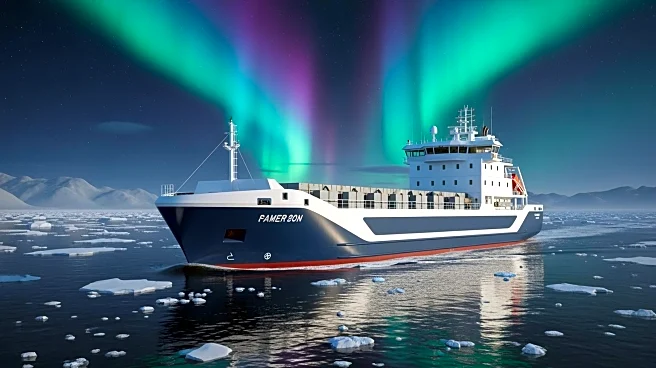What's Happening?
Stena Line, one of Europe’s largest ferry operators, has agreed to acquire Wasaline, the northernmost shipping company operating between Finland and Sweden. The acquisition aims to enhance operations and maintain
the ferry service that has been in place for over 50 years. Wasaline, operated by NLC Ferry under the trade name, was established by the cities of Vaasa, Sweden, and Umeå, Finland, to continue trade operations. The acquisition includes the revolutionary hybrid ferry, Aurora Botnia, which operates on biogas and batteries, making it the first international green shipping corridor. Stena Line plans to maintain the operation of Wasaline while Kvarken Line, jointly owned by the two cities, will continue to own the vessel.
Why It's Important?
The acquisition of Wasaline by Stena Line underscores the strategic importance of maintaining robust shipping routes in northern Europe. By integrating Wasaline's operations, Stena Line enhances its access to alternative fuels and strengthens intermodal transport links. This move is significant for regional trade and environmental sustainability, as the Aurora Botnia ferry represents a shift towards greener shipping practices. The acquisition also highlights the role of municipal partnerships in preserving essential infrastructure and services, ensuring continued economic connectivity between Finland and Sweden.
What's Next?
The acquisition deal requires approval from the municipal councils of Vaasa and Umeå, expected to occur in November, with the closing anticipated in early 2026. Stena Line plans to continue growing the operation, focusing on enhancing the economic importance of the ferry service. The integration of Wasaline's operations may lead to further investments in green technology and alternative fuels, aligning with global trends towards sustainable shipping practices.
Beyond the Headlines
The acquisition reflects broader trends in the shipping industry, where companies are increasingly investing in sustainable technologies to reduce environmental impact. The use of biogas and battery-powered ferries represents a significant step towards decarbonizing maritime transport. Additionally, the partnership between municipal governments and private operators highlights the importance of collaboration in maintaining essential services and infrastructure.









